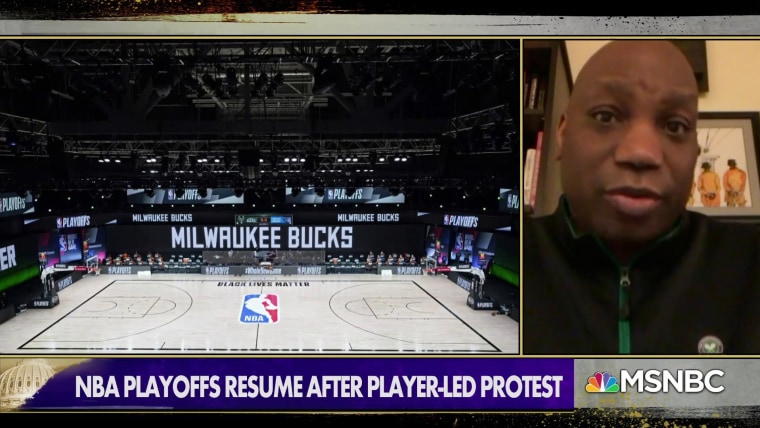John Carlos imagines what the reaction and impact would have been had Twitter existed in 1968.
That year, he and USA Olympic track and field teammate Tommie Smith, two Black American athletes, took their places on the 200-meter-dash medal podium wearing only socks on their feet, and each raised a gloved fist — a Black Power salute — against racial injustice and inequality.
Despite the absence of the internet 52 years ago, Carlos, 75, and Smith, 76, still made a seismic statement with their activism during the Summer Olympic Games in Mexico City.
Athletes today “have such a great platform now that’s universal, this thing called social media,” Carlos said in an interview. “You can reach the far ends of the Earth. You might say, back in 1968, maybe I was the forefront of social media, because our demonstration was on a worldwide level.”
Their stance was a seminal moment in sports that has more recent echoes in the decision by former San Francisco 49ers quarterback Colin Kaepernick to take a knee during the national anthem four years ago and in the walkouts by NBA, WNBA and major league baseball players last week. Those athletes refused to take the court or the field in protest of the shooting of a Black man, Jacob Blake, by police in Kenosha, Wisconsin, and the mistreatment of others who have been victims of police brutality and gun violence this year.
“Right now, as a collective body, the athletes are telling ownership throughout sports: ‘If you don’t get up off your butt and start to make the right decisions relative to what’s happening to your specific race of people that represents your dollar … if you don’t get up, we will,'” Carlos said.
The financial impact on Carlos and Smith because of their protest was only one layer of the enormous adversity they faced at the time. Both men had been part of the Olympic Project for Human Rights, which pushed for a boycott of the ’68 Games as the civil rights movement roared on across the United States. After their protest on the medal stand — Smith won the gold medal, and Carlos won the bronze — the two men encountered enormous blowback, and they were eventually expelled from the games by the International Olympic Committee. The Australian silver medalist, Peter Norman (who died in 2006), was also pushed out of the sport for wearing an Olympic Project for Human Rights badge on the medal stand with Carlos and Smith.
Carlos said it may seem as though athletes’ activism has been dormant in the more than 50 years since he and Smith raised their fists, but it may have had a lot to do with lacking a platform to reach the masses.
“Athletes would make statements, but you would never hear about it because they wouldn’t let the world know about it,” Carlos said. “Social media is like the glass the pirates looked through on the ship. What’s happening afar?”
But even when Kaepernick took a knee and other athletes followed, Kaepernick faced steep consequences. A former starter for the San Francisco 49ers who took the team to a Super Bowl, Kaepernick has remained unsigned since 2017.
“It’s beyond obvious that Colin remains blacklisted,” Kaepernick’s attorney, Mark Geragos, said.
Carlos said that while last week’s walkouts sent a powerful message, the protests were done in empty arenas and stadiums because of the coronavirus pandemic, probably mitigating the financial impact.
“This is just the start of things to come. We have their attention. But we don’t have their full attention, because, economically, this really didn’t impact [team owners] yet,” Carlos said. “There’s no one in an athletic arena right now in terms of spectatorship. Imagine how much they would have been rushing to the table had there been a full stadium or arena and the athletes chose not to come out. It would have been extraordinarily powerful.”
In terms of how sports commissioners have addressed social issues and players’ desire to peacefully protest, Carlos said he has been impressed with NBA Commissioner Adam Silver’s lead, starting with Silver’s issuing a lifetime ban to Donald Sterling in 2014 after Sterling, then the owner of the Los Angeles Clippers, made racist comments in a recording.
Carlos said he has been less encouraged by NFL Commissioner Roger Goodell, who said in a recent interview with former NFL player Emmanuel Acho that he wished the league “had listened earlier” to Kaepernick. Goodell also said in a video statement this summer that the NFL had made a mistake by not listening to players’ activism closely enough, although he did not mention Kaepernick by name then.
“Mr. Goodell has to answer to those same owners that I have said were hesitant and have been zip-lipped relative to this situation that we’re confronted with today, which is systemic racism,” Carlos said. “They pretty much put a lid on his response. And it got to the point where social media has made it so broad and so wide, they as owners had to be flexible enough to allow him to say: ‘Well, maybe I made a mistake. And I should have listened to Kaepernick sooner.'”
With the presidential election just over two months away, Carlos said, voters have a chance to bring about change and continue advancing the message of racial equality.
“There’s so many things that we see loud and clear now. It’s debilitating to Black people in particular. Those in power, either they don’t see our pain or feel our pain or don’t give a s— about our pain,” Carlos said. “Listen, anybody that has a social conscience and believes in humanity, that’s what we’re all fighting for. Remember, humanity has no color. It’s transparent.”












